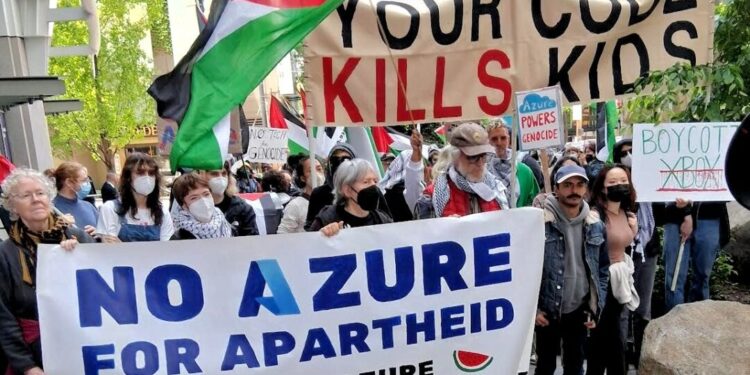A growing wave of employee-led activism took center stage at Microsoft’s annual Build conference in Seattle on May 19, 2025, as demonstrators gathered to protest the tech giant’s alleged collaboration with the Israeli military. The protest, organized by the group “No Azure for Apartheid,” included current Microsoft employees and activists from across the Pacific Northwest, all demanding that the company cut ties with the Israeli government over concerns its technology is being used in military operations against Palestinians.
The demonstration gained national attention after two Microsoft workers interrupted CEO Satya Nadella’s keynote address, openly challenging the company’s role in what they described as “high-tech genocide” in Gaza. The protestors claim that Microsoft’s Azure cloud computing services, coupled with artificial intelligence tools, are supporting Israel’s digital infrastructure for population management and military coordination, further intensifying the conflict in the region.
The protest continued into the next day, when approximately 200 demonstrators marched around the Seattle Convention Center where the Build event was being held. Chants such as “Say it clear and say it loud! Microsoft get off the cloud!” echoed through the streets as protestors held signs, gave speeches, and attempted to engage with conference attendees. Tensions escalated when one protestor attempted to breach a security barrier at the entrance, leading to an arrest by Seattle police.
This demonstration was not an isolated event. It followed earlier actions organized by “No Azure for Apartheid” in March and April, including disruptions during Microsoft’s 50th-anniversary celebration and several internal company events. The movement, inspired by broader campaigns for corporate accountability in military and surveillance technologies, is pressuring Microsoft to publicly end its contracts with the Israeli military and take a definitive stance by calling for a permanent ceasefire in the Gaza conflict.
Microsoft, with a market valuation exceeding $2 trillion, has remained largely silent on the specifics of its contracts. However, critics argue that its deepening ties to defense and intelligence sectors raise serious ethical questions about the use of artificial intelligence and cloud infrastructure in conflict zones. The controversy underscores a broader reckoning in the tech industry, where employees and activists are increasingly demanding transparency and accountability in how technologies are deployed globally.
As public pressure mounts and internal dissent grows, Microsoft faces a pivotal moment in its corporate governance. The ongoing protests highlight a critical intersection between technology, politics, and human rights—one that may define the next chapter of the company’s global presence and ethical standing.







